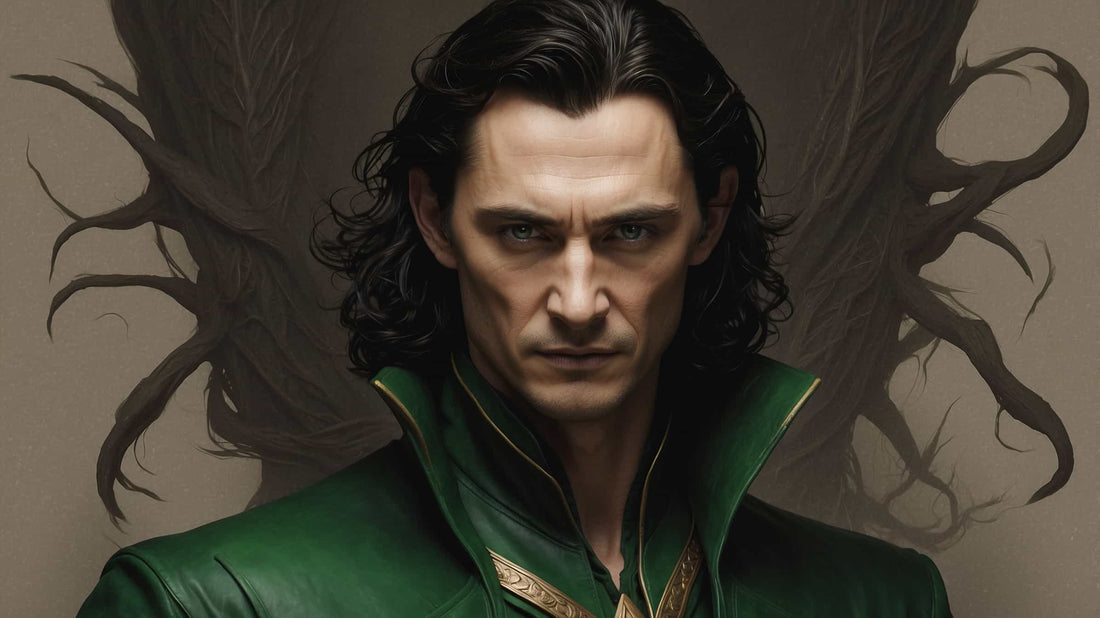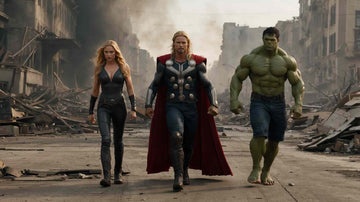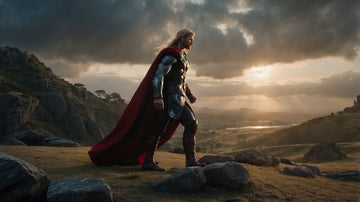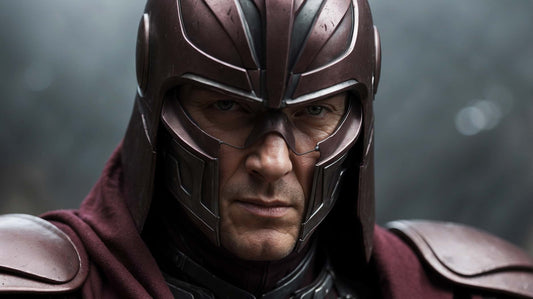
What are Loki's origins in Marvel?
Loki, the famous god of mischief from the Marvel universe, fascinates fans with his complex journey and mythological origins. Sometimes a formidable enemy of Thor, sometimes an unexpected ally, this character moves between shadow and light. But who really is Loki? Discover here his true origins, his tumultuous past, and the reasons that make him such a captivating character, oscillating between villain and hero!
Loki's Past
Loki is a complex character whose origins blend Norse mythology and the Marvel universe. The biological son of Laufey, king of the Frost Giants, he was born on Jotunheim, a frozen and inhospitable world. As a child, he was abandoned due to his small size, far below that of other giants.
It was then that Odin, king of Asgard, found him on the battlefield after a war between Asgard and the Frost Giants. Odin, seeking to establish a truce between the two realms, adopted Loki and brought him to Asgard.
As he grew up alongside Thor, heir to the throne of Asgard, Loki developed a conflictual relationship with his adoptive brother. While Thor was the strong and direct warrior, Loki was more cerebral, using his gifts of magic and deception.
This duality fueled rivalries that evolved throughout the Marvel narratives. Loki, often in search of recognition and attention, oscillated between admiration and jealousy towards Thor.
Loki's past is thus marked by feelings of rejection and a thirst for belonging. Discovering himself different from the Asgardians, he became the "god of mischief" or "god of lies," and began to develop plans to surpass Thor and sometimes even to control Asgard.
His complex past feeds his acts of betrayal, but also his moments of bravery, making him one of the most nuanced and unpredictable characters in the Marvel universe.

Who are Loki's real parents?
The real parents of Loki are Laufey and Farbauti, two figures from Norse mythology who are also present in the Marvel universe.
Laufey, king of the Frost Giants, is a cruel and uncompromising ruler.
Farbauti, barely mentioned in the comics, is a giantess known in the myths as Loki's mother but does not appear directly in the Marvel stories.
At his birth, Laufey noted that Loki was much smaller than other giants, prompting him to abandon him. This rejection is crucial to understanding Loki's complexity: born with characteristics that differentiate him from his own people, he grows up in Asgard, a realm not his own.
The status of orphan, long hidden, pushes him to question his identity and his place in the world.
The revelation of his true origins, often a shock in the narratives, leads him to question his loyalty to Odin and his own people of origin, the Frost Giants. This dual heritage influences Loki's choices, oscillating between the desire for revenge against Asgard and the desire to prove his worth to the Asgardians.
His relationship with his biological parents is thus a central element of his torments and motivations in the Marvel universe.
Is Loki Thor's brother?
Although Loki and Thor are often called brothers, their bond is primarily adoptive. After finding the abandoned Loki, Odin decided to raise him as his own son, just like Thor, the heir of Asgard.
Their relationship is complex and full of rivalry, exacerbated by their deep differences.
Thor, being Odin's biological son, is destined to rule Asgard. Loki, although raised as an Asgardian prince, later discovers that he comes from a hostile race, reinforcing his feeling of never truly belonging.
This fraternal rivalry has major repercussions in the Marvel stories. Loki harbors a deep jealousy towards Thor, who benefits from Odin's affection and the respect of the Asgardians.
In response, Loki turns to magic and deception to gain power, developing a style of combat and skills in direct opposition to Thor's brute force.
Their bond, though adoptive, leads to numerous emotional conflicts and unexpected alliances.
The two characters go through periods of intense rivalry, but also mutual support in critical moments. This ambiguous relationship between brother and enemy makes Loki a fascinating character, who oscillates between resentment and attachment towards Thor.

Who is Loki's wife in Marvel?
In the Marvel universe, Loki's most well-known companion is Sigyn, a goddess from Asgard. Sigyn is often portrayed as a loyal and devoted woman, in contrast to Loki's complex and unstable personality. Their marriage is a source of intrigue, as despite Loki frequently causing trouble and committing dubious acts, Sigyn remains faithful by his side, even during his darkest moments.
In Norse myths, Sigyn is famous for her role during Loki's punishment after his misdeeds. In this version, she holds a bowl to catch the venom of a snake dripping onto his face, accepting her fate out of love and loyalty. This act of devotion is rarely depicted in the Marvel comics, where Sigyn is less present than in the myths.
Beyond Sigyn, Marvel explores several versions of Loki, sometimes of different genders, which blurs traditional romantic relationships. In some stories, Loki changes form and explores different relationships, reflecting his changeable character and nature as the god of lies. Although Sigyn remains the most emblematic figure, the Marvel universe often plays with this dynamic to explore Loki's polymorphic nature.
Why did Odin adopt Loki?
Odin adopts Loki for various reasons that combine political strategy and compassion. Originally, Odin discovered the young abandoned Loki after a battle against the Frost Giants. Odin saw in this adoption a way to stabilize the relations between Asgard and Jotunheim, hoping that Loki's integration would serve as a symbol of peace between the two peoples.
However, versions of the story also show that Odin was driven by a certain attachment to this fragile child. Loki grew up with Thor, and although Odin considered him his son, he never intended him for the throne of Asgard.
This lack of official recognition from Odin towards Loki is one of the causes of Loki's internal conflicts.
Odin's decision to conceal Loki's origins creates a feeling of betrayal when the truth is revealed. Loki feels manipulated, used as a political tool rather than considered as a full member of the royal family.
This situation fuels Loki's quest for identity and his ambivalence towards Odin, whom he admires as much as he resents him.

Is Loki a villain or a superhero?
The character of Loki is constantly evolving, making him oscillate between villain, anti-hero, and even ally depending on the circumstances.
In the early Marvel comics, Loki is primarily an antagonist to Thor, embodying the role of the god of mischief, sowing discord in Asgard and on Earth. But over time, Marvel explores deeper facets of the character, revealing his inner struggles and complex motivations.
Loki is therefore often seen as an anti-hero, a character who acts according to his own interests but who sometimes finds himself on the side of the heroes. In several recent narratives, particularly in the MCU, Loki helps Thor and other characters for causes that surpass him, showing signs of redemption.
His personality is shaped by his inner conflicts, between his loyalty to Asgard and his desire for power.
In Norse mythology and in modern adaptations, Loki is an ambivalent character, neither entirely good nor wholly evil. His status as the god of lies allows him to manipulate reality, but also to deceive expectations. This complexity makes him one of the most popular characters in Marvel, as each new adventure provides a unique perspective on his unpredictable and captivating nature.
At the end of Season 2 of the series Loki, the character shows an unexpected side of his personality.
Faced with the threat of the collapse of the multiverses, Loki makes a heroic decision by accepting a huge sacrifice to contain the realities and prevent the destruction of everything that exists.
This ultimate act reveals his evolution towards a protective role, showing that, despite his past as the god of mischief, Loki can act for the common good. This action raises the question of his moral alignment and finally allows him to be considered a true hero.
By the MySuperSuit Team






